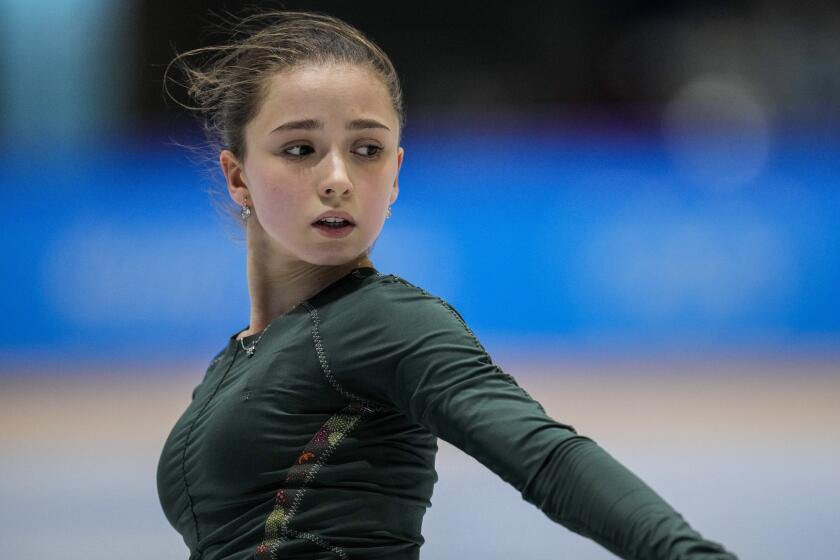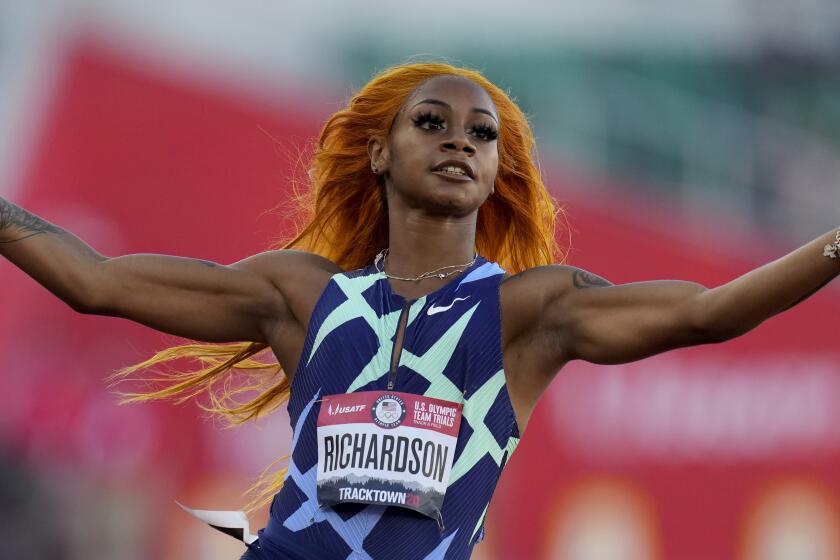Editorial: Kamila Valieva is a brilliant skater, but should she be at the Olympics?

After an initial stumble, Kamila Valieva clearly gave another splendid performance in the short figure skating program Tuesday, jumping and spinning her way to the top of the 2022 Winter Olympics in Beijing. Less clear, though, is whether the Russian phenomenon belonged on the ice at all, after it was revealed that trace amounts of a performance-enhancing medication were found in her urine test.
Trimetazidine, a heart medication that can increase an athlete’s endurance, was discovered in a Dec. 25 urine sample taken during an earlier Russian national competition, but the results weren’t reported until a little over a week ago. Did Valieva choose to take the drug? Was she unknowingly dosed by a hyper-competitive coach or another adult? Or was it the result, as her mother said, from sharing a glass with her grandfather who takes heart medicine?
It could take months for the World Anti-Doping Agency to get to the bottom of this, if it ever does. At the same time, WADA and the International Olympic Committee need to look at their own stumbles — including the bad decision by the IOC to cancel the medals ceremony in women’s individual figure skating, which robs the other skaters of a well-earned moment to shine on the podium. They should hold the ceremony even if it means there’s a chance that Valieva will be stripped of her medal down the road.
Decision by Court of Arbitration for Sport indicates it’s OK to be a drug cheat if you are younger than 16. IOC won’t hold medal ceremonies in response to ruling.
There are aspects of the Valieva case that teeter on the line of what should be excused and what should be firmly disciplined. The delay in reporting test results — which is what gave the Russian Anti-Doping Agency the authority to suspend Valieva one day and reinstate her the next — is the consequence of incompetent oversight and communications by both that organization and WADA.
But some reasons given for allowing Valieva to skate don’t hold up. That she has “protected” status under WADA rules because she is 15, and thus neither that agency nor the IOC could reverse the Russian agency’s decision? Please. A 15-year-old is perfectly capable of making the right decision. If teenagers aren’t going to be held responsible for their actions, that provides an evermore unlevel skating rink. Obviously, if Valieva was medicated without her knowledge, that’s not her fault — but that doesn’t necessarily mean she should be allowed to compete. Such a decision would encourage unsavory coaches, managers and others to dose unwitting athletes.
For that matter, what are Russian athletes doing in Beijing at all? Russia has been under suspension from all international sporting competitions since 2019 because of a government-run doping scheme during the 2014 Sochi Games. But Russian athletes have been allowed to compete under the auspices of the so-called Russian Olympic Committee. What’s the difference? Just this: The Russian flag can’t be flown, nor the anthem sung. No one is fooled. It’s a tough call because athletes who compete cleanly shouldn’t be punished for a corrupt government, but it renders WADA’s discipline pretty meaningless.
Beyond that, a national anti-doping agency shouldn’t be allowed to determine who competes in the Olympics, a decision that the Court of Arbitration for Sport declined to overturn using the silly argument about Valieva’s age. The ultimate authority should belong to the IOC and WADA.
The popular sprinter knew what the rules were and chose to break them. But the anti-doping rules that ban marijuana and not alcohol make little sense.
What’s especially grating about all this is how the equally luminous athlete, sprinter Sha’Carri Richardson, was kept from competing in the Tokyo Games because she had used marijuana last year — legal in Oregon, where she used it, and only days after she learned from a reporter that her mother had died. She knowingly broke the rules and accepted the consequences, even though the IOC’s marijuana policy is unreasonable. Its own medical director found in 2018 that there was no evidence that marijuana makes athletes more competitive.
The WADA investigation into Valieva’s case is appropriate, but beyond that, the agency and the IOC need to acknowledge and revise the foolish, inconsistent rules they set and their own failure to oversee drug tests properly.
Valieva has talent enough to make a name for herself without performance-enhancing drugs. She’s known for balletic grace, perfect positioning and those arms reaching to the sky on jumps. But unless and until she is cleared by WADA, she won’t reach high enough this year to grab a gold medal.
More to Read
A cure for the common opinion
Get thought-provoking perspectives with our weekly newsletter.
You may occasionally receive promotional content from the Los Angeles Times.












